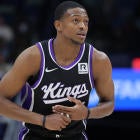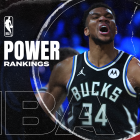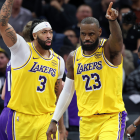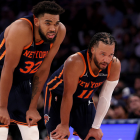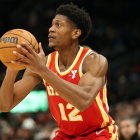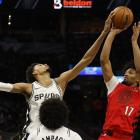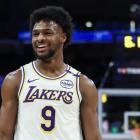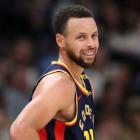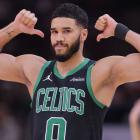NBA predictions are a fool's errand in October, and any honest preseason prognosticator would admit that there's no way to know which mid-tier teams will exceed expectations and which will sink because of injuries, chemistry or any other number of factors. This year, though, is particularly tough. As easy as it is to identify the top teams in the West and the East, it's almost impossible to figure out who is going to occupy the No. 4 to No. 8 spots in each conference's playoff picture. With that in mind, here are the best- and worst-case scenarios for 10 particularly confusing teams:
 Chicago Bulls
Chicago Bulls
Floor: Chicago completely falls apart. When Dwyane Wade, Rajon Rondo and Jimmy Butler fail to jell, the front office revisits its draft-night discussions about a full teardown, deciding at the deadline to trade Butler and start over. The Bulls essentially tank, and everybody feels sorry for Taj Gibson.
Ceiling: Chicago's plan proves to be just crazy enough to work, as Rondo and Wade's experience and basketball IQ outweigh their lack of shooting range. The two veterans figure out how to complement Butler by cutting away from the ball and focusing their energy on having bounce-back seasons defensively. Nikola Mirotic finds consistency and young role players Doug McDermott, Bobby Portis, Jerian Grant, Denzel Valentine and Cristiano Felicio all flourish. Just like when Tom Thibodeau was around, the Bulls win 45-plus games.
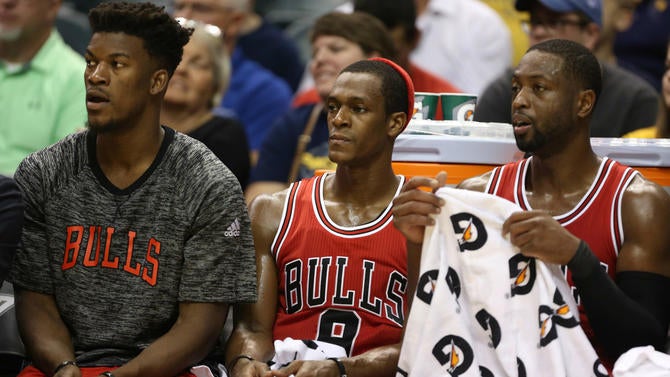
 Oklahoma city Thunder
Oklahoma city Thunder
Floor: Without Kevin Durant, the Thunder are exposed for their lack of playmakers, floor spacing and defenders with size. Sure, Russell Westbrook gets his numbers, but neither Victor Oladipo nor Steven Adams emerges as much of a threat in the halfcourt. When OKC misses the playoffs, it suddenly finds itself in a precarious place, needing to construct a totally different type of team heading into the 2017-18 season, after which Westbrook can become an unrestricted free agent.
Ceiling: Westbrook wins MVP, Oladipo and Adams earn All-Star consideration, Enes Kanter improves defensively, Kyle Singler and Andre Roberson shoot consistently well and Domantas Sabonis and Cameron Payne prove to be the steals of the past two drafts. The Thunder exceed expectations, fighting for home-court advantage in the West despite Durant's defection. This makes them an attractive destination for Blake Griffin next summer.
 New York Knicks
New York Knicks
Floor: Despite a splashy summer, the Knicks once again fail to deliver on their promise of returning to the playoffs. Predictably, they deal with significant injuries, and their lack of depth ends up costing them. Fans lament that the front office gave up so much for a one-year Derrick Rose rental, especially as rumors about president Phil Jackson returning to Los Angeles intensify. Instead of ascending to stardom, Kristaps Porzingis stagnates, struggling to find his place as Rose and Carmelo Anthony dominate the ball.
Ceiling: Porzingis emerges as a pillar of New York's new attack, proving to be so dangerous as a screen-setter and spot-up shooter that coach Jeff Hornacek all but disposes of the triangle offense. Rose and backup Brandon Jennings play with pace, freedom and efficiency. Anthony builds on his feel-good, Olympic-winning summer. Joakim Noah stays healthy, wins Defensive Player of the Year and everybody writes that, if there was a Comeback Player of the Year award, he'd have won that, too. Thanks to an injured opponent in the Knicks' second-round series, they advance to the conference finals for the first time in 16 years.
 Memphis Grizzlies
Memphis Grizzlies
Floor: In a repeat of 2015-16, the Grizzlies' chemistry and coaching can't sustain them when the wave of injuries hits. Their starting lineup posts one of the best net ratings in the league, but it doesn't matter because they're almost never all healthy at the same time. Despite Zach Randolph's move to the bench, their second unit bleeds points consistently, leading Chandler Parsons to wonder why in the world he didn't just sign with the Trail Blazers -- though he never says so publicly. After Memphis misses the playoffs for the first time since 2010, the stage is set for Tony Allen and Zach Randolph to go elsewhere in free agency, signifying the official end of the grit-n-grind era.
Ceiling: Parsons proves to be the playmaking small forward they always needed, and he and coach David Fizdale breathe new life into an offense that badly needed a makeover. After Parsons and Mike Conley make their first All-Star appearances, they laugh with MVP candidate Marc Gasol about the critics who assumed the three of them couldn't stay healthy. With the veterans providing a solid foundation, young players JaMychal Green, Wade Baldwin, Deyonta Davis and Jordan Adams all find ways to fit in. The Grizzlies lose to the Warriors in the playoffs, but they push the eventual champs more than any other opponent.
 Atlanta Hawks
Atlanta Hawks
Floor: At the trade deadline, Atlanta is once again forced to coldly assess its future. This time, with Dwight Howard stopping the ball, Dennis Schröder turning it over and the bench floundering, the Hawks choose to move star forward Paul Millsap. As president and coach Mike Budenholzer tries to plan for an uncertain future, he briefly ruminates on the fact that they won 60 games just two years ago. "It feels more like two decades ago," he jokes to Gregg Popovich in a private conversation, and Popovich tells him that his job is simple: just go out and find five more two-way players on bargain contracts who perfectly complement each other. Easy, right?
Ceiling: Budenholzer proves that great coaches are adaptable, winning 50 games with Howard anchoring Atlanta's defense and setting pick-and-roll after pick-and-roll for Schröder, who wins Most Improved Player despite his per-possession statistics remaining virtually identical. Kyle Korver makes almost 50 percent of his 3s, just like he did in 2015, and Kent Bazemore makes about 40 percent of his. Rookies DeAndre Bembry and Taurean Prince both make the All-Rookie team, and the Hawks upset Al Horford's Celtics en route to the conference finals, where they lose to LeBron James' Cavaliers again. This time, though, it is not a sweep.

 Washington Wizards
Washington Wizards
Floor: Bradley Beal misses a third of the season again, and with a completely different roster, coach Scott Brooks receives the same criticism he heard in Oklahoma City: the offense is too predictable and bland. Once again, John Wall is forced to shoulder a huge burden, as offseason additions Ian Mahinmi, Jason Smith and Andrew Nicholson fail to justify their contracts. Marcin Gortat openly sulks about the situation and, amid rumors about his lack of job security, general manager Ernie Grunfeld swings for the fences on a major trade at the deadline. Washington misses the playoffs. Randy Wittman is vindicated.
Ceiling: Gortat and Mahinmi give the Wizards the best center depth in basketball, and both Markieff Morris and Nicholson provide them with the spacing they've been searching for. Not only does Otto Porter finally break out, but second-year swingman Kelly Oubre and rookie guard Tomas Satoransky combine to make their reserve unit as athletic and dangerous as anybody's in the East. It turns out that those who predicted Washington would be Cleveland's biggest challenger last season were only a year off.
 New Orleans Pelicans
New Orleans Pelicans
Floor: Anthony Davis' career arc continues to look a lot like Kevin Garnett's, and that's both good and bad. Davis puts up MVP-caliber numbers, but gets no consideration for the award because his team doesn't come close to making the postseason. More than one column is written wondering if the Pelicans are cursed because of injuries, and it seems obvious that the front office will make major changes in the offseason.
Ceiling: Despite a flawed roster, New Orleans makes the playoffs on the strength of Davis' otherworldly season, a fast-paced offense and a much-improved defense. Buddy Hield wins Rookie of the Year, Solomon Hill makes about 40 percent of his 3-pointers and Terrence Jones earns himself a raise. Even though the Pelicans lose in the first round, NBA observers are excited about them again.
 Indiana Pacers
Indiana Pacers
Floor: Nate McMillan abandons the idea of playing faster when the Pacers can't stop anybody or space the floor. Slowing down does not help them get stops, as Myles Turner fails to grasp the intricacies of team defense and Al Jefferson looks even slower than he was in Charlotte. Monta Ellis doesn't take it well when McMillan tells him to come off the bench, as he and Jeff Teague prove to be almost as bad a fit as he and Rajon Rondo were. Paul George vents about how Indiana needs to toughen up, as he was in no way prepared for this to be a lottery team.
Ceiling: George backs up his claim that he's ready to take on LeBron James, and Turner shows that the front office made the right decision by letting go of Ian Mahinmi. Teague is named an All-Star for the second time, Jefferson dominates reserve bigs and McMillan helps the Pacers redefine themselves as a fast, exciting team. They don't become true contenders, but they show enough promise to get George to sign an extension like Russell Westbrook did in Oklahoma City.
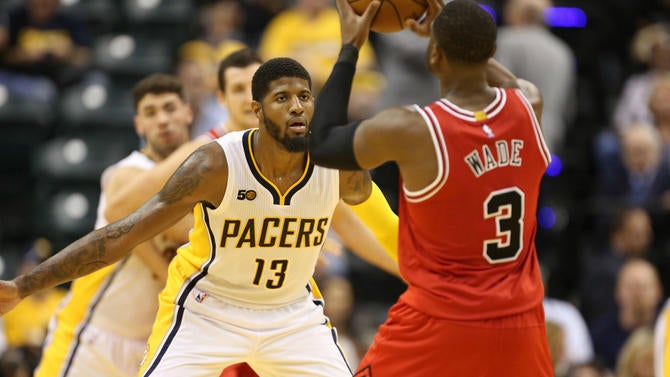
 Milwaukee Bucks
Milwaukee Bucks
Floor: The offense remains abysmal, the defense remains disappointing and the 2014-15 season is confirmed to be an aberration. As Jabari Parker stagnates and Thon Maker struggles, the Bucks' once-promising "core" is reduced to just Giannis Antetokounmpo and Khris Middleton, who misses most of the season because of a torn hamstring. Antetokounmpo, by the way, attempts the most 3-pointers of his career but only makes a quarter of them.
Ceiling: The great point guard experiment pays off, with Antetokounmpo emerging as an All-Star and Matthew Dellavedova serving as a perfect secondary playmaker in the starting unit. Jabari Parker extends his range, expands his game and plays himself into a near-max extension. Malcolm Brogdon and Michael Beasley do enough to keep the team afloat when Middleton is out, and his return makes Milwaukee one of the teams that nobody wants to play in the postseason. It's not even surprising when the Bucks advance to the second round.
 Dallas Mavericks
Dallas Mavericks
Floor: Rather than showing that he can do more than he was asked to in Golden State, an expanded role reveals that Harrison Barnes' ex-teammates were covering up his flaws. He becomes a turnover machine when he tries to make plays, and, without the open looks generated by the Splash Brothers, his 3-point percentage plummets. Fellow former Warrior Andrew Bogut misses large stretches of the season because of injuries, Wesley Matthews never quite finds his form and the Mavericks finally fail to make the playoffs, leading to another round of rumors about Golden State trying to convince Dirk Nowitzki to chase a ring.
Ceiling: As usual, coach Rick Carlisle and Nowitzki get Dallas to the postseason, with Bogut providing elite defense and the sort of passing that this team has never had at his position. Barnes plays only a supporting role at first, but his production improves as the season goes on and Carlisle encourages him to be more aggressive. Seth Curry wins Most Improved Player, and casual fans have no idea how backup centers Salah Mejri and A.J. Hammons have superstar-level PERs in limited minutes. With a favorable matchup and incredible coaching, the Mavericks get out of the first round for the first time since they won the 2011 title.









